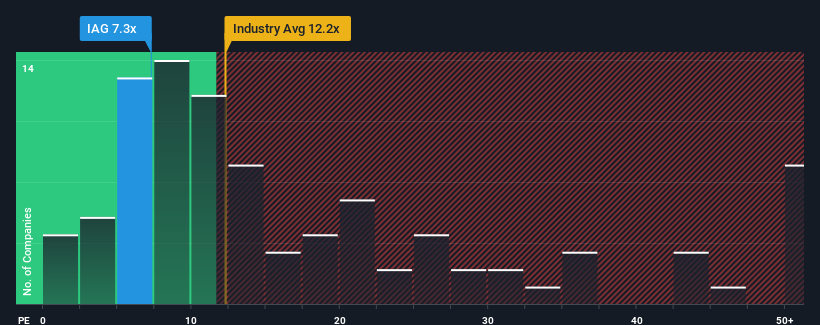The Market Doesn't Like What It Sees From iA Financial Corporation Inc.'s (TSE:IAG) Earnings Yet

With a price-to-earnings (or "P/E") ratio of 7.3x iA Financial Corporation Inc. (TSE:IAG) may be sending bullish signals at the moment, given that almost half of all companies in Canada have P/E ratios greater than 14x and even P/E's higher than 27x are not unusual. Nonetheless, we'd need to dig a little deeper to determine if there is a rational basis for the reduced P/E.
With its earnings growth in positive territory compared to the declining earnings of most other companies, iA Financial has been doing quite well of late. It might be that many expect the strong earnings performance to degrade substantially, possibly more than the market, which has repressed the P/E. If you like the company, you'd be hoping this isn't the case so that you could potentially pick up some stock while it's out of favour.
See our latest analysis for iA Financial

How Is iA Financial's Growth Trending?
The only time you'd be truly comfortable seeing a P/E as low as iA Financial's is when the company's growth is on track to lag the market.
Taking a look back first, we see that the company grew earnings per share by an impressive 273% last year. Pleasingly, EPS has also lifted 113% in aggregate from three years ago, thanks to the last 12 months of growth. So we can start by confirming that the company has done a great job of growing earnings over that time.
Looking ahead now, EPS is anticipated to slump, contracting by 22% during the coming year according to the seven analysts following the company. With the market predicted to deliver 13% growth , that's a disappointing outcome.
In light of this, it's understandable that iA Financial's P/E would sit below the majority of other companies. However, shrinking earnings are unlikely to lead to a stable P/E over the longer term. There's potential for the P/E to fall to even lower levels if the company doesn't improve its profitability.
The Bottom Line On iA Financial's P/E
Using the price-to-earnings ratio alone to determine if you should sell your stock isn't sensible, however it can be a practical guide to the company's future prospects.
We've established that iA Financial maintains its low P/E on the weakness of its forecast for sliding earnings, as expected. At this stage investors feel the potential for an improvement in earnings isn't great enough to justify a higher P/E ratio. It's hard to see the share price rising strongly in the near future under these circumstances.
We don't want to rain on the parade too much, but we did also find 2 warning signs for iA Financial (1 shouldn't be ignored!) that you need to be mindful of.
Of course, you might also be able to find a better stock than iA Financial. So you may wish to see this free collection of other companies that have reasonable P/E ratios and have grown earnings strongly.
Valuation is complex, but we're here to simplify it.
Discover if iA Financial might be undervalued or overvalued with our detailed analysis, featuring fair value estimates, potential risks, dividends, insider trades, and its financial condition.
Access Free AnalysisHave feedback on this article? Concerned about the content? Get in touch with us directly. Alternatively, email editorial-team (at) simplywallst.com.
This article by Simply Wall St is general in nature. We provide commentary based on historical data and analyst forecasts only using an unbiased methodology and our articles are not intended to be financial advice. It does not constitute a recommendation to buy or sell any stock, and does not take account of your objectives, or your financial situation. We aim to bring you long-term focused analysis driven by fundamental data. Note that our analysis may not factor in the latest price-sensitive company announcements or qualitative material. Simply Wall St has no position in any stocks mentioned.
About TSX:IAG
iA Financial
Provides insurance and wealth management services in Canada and the United States.
Established dividend payer with proven track record.


